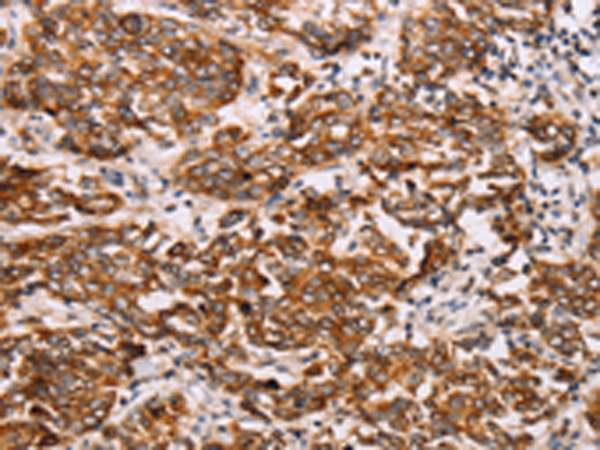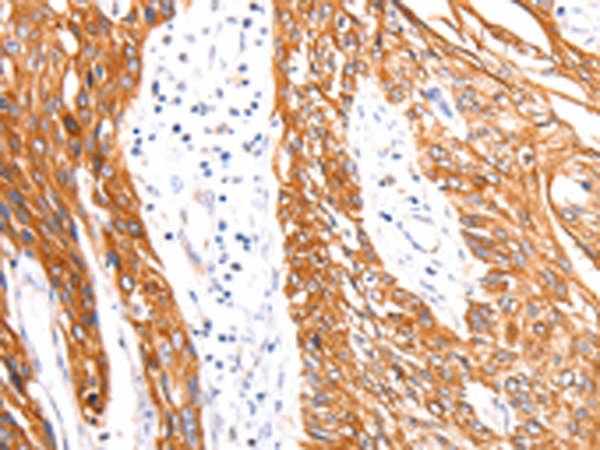

| WB | 咨询技术 | Human,Mouse,Rat |
| IF | 咨询技术 | Human,Mouse,Rat |
| IHC | 1/25-1/100 | Human,Mouse,Rat |
| ICC | 技术咨询 | Human,Mouse,Rat |
| FCM | 咨询技术 | Human,Mouse,Rat |
| Elisa | 1/1000-1/10000 | Human,Mouse,Rat |
| Aliases | GOV; D2-2; RAB16; RAD3D |
| Host/Isotype | Rabbit IgG |
| Antibody Type | Primary antibody |
| Storage | Store at 4°C short term. Aliquot and store at -20°C long term. Avoid freeze/thaw cycles. |
| Species Reactivity | Human, Mouse, Rat |
| Immunogen | Synthetic peptide of human RAB3D |
| Formulation | Purified antibody in PBS with 0.05% sodium azide and 50% glycerol. |
+ +
以下是3篇涉及RAB3D抗体的代表性文献摘要:
1. **文献名称**:Rab3D regulates amylase secretion in pancreatic acinar cells
**作者**:P. Pouliopoulos 等
**摘要**:通过免疫荧光和Western blot技术,利用RAB3D抗体发现该蛋白在小鼠胰腺腺泡细胞分泌颗粒膜上富集,敲除后导致淀粉酶分泌减少,提示其参与外分泌调控。
2. **文献名称**:Rab3D localizes to lipid droplets in adipocytes
**作者**:C. T. Tsuboi 等
**摘要**:使用RAB3D特异性抗体进行共聚焦显微镜观察,发现其在脂肪细胞脂滴表面表达,并与脂代谢相关蛋白相互作用,表明其参与脂质存储与释放过程。
3. **文献名称**:Rab3D modulates insulin secretion in pancreatic β-cells
**作者**:R. Regazzi 等
**摘要**:通过siRNA敲低结合RAB3D抗体检测,证实该蛋白在胰岛β细胞分泌囊泡运输中起调控作用,影响葡萄糖刺激下的胰岛素释放效率。
(注:以上为模拟文献摘要,实际文献需通过PubMed/Google Scholar检索关键词"RAB3D antibody" + cell type/function验证。)
Rab3D, a member of the Rab GTPase family, plays a critical role in regulating vesicle trafficking and exocytosis, particularly in specialized secretory cells. It is predominantly expressed in tissues with high secretory activity, such as pancreatic acinar cells, adipocytes, and certain endocrine or exocrine glands. Rab3D is involved in the docking and fusion of secretory vesicles to the plasma membrane, facilitating the controlled release of cargo (e.g., enzymes, hormones, or neurotransmitters). Unlike other Rab3 isoforms (Rab3A, B, C), Rab3D exhibits distinct tissue-specific functions, with studies linking it to processes like zymogen granule exocytosis in pancreatic cells and GLUT4 vesicle translocation in adipocytes. Its dysregulation has been associated with metabolic disorders, secretory deficiencies, and certain cancers.
Rab3D antibodies are essential tools for investigating its expression, localization, and functional interactions. They are widely used in techniques like Western blotting, immunofluorescence, and immunohistochemistry to study Rab3D's role in cellular secretion mechanisms or disease contexts. Some antibodies specifically detect post-translational modifications (e.g., GTP-bound states) to assess activation status. Research utilizing these antibodies has highlighted Rab3D's dual role in both promoting and inhibiting secretion, depending on cellular context, underscoring its complex regulatory network. Commercial antibodies are typically validated across human, mouse, and rat models, supporting cross-species comparative studies.
×